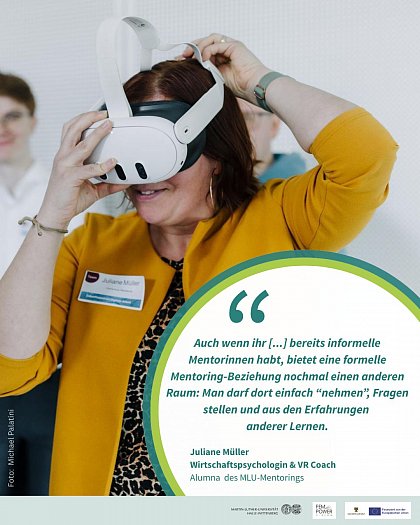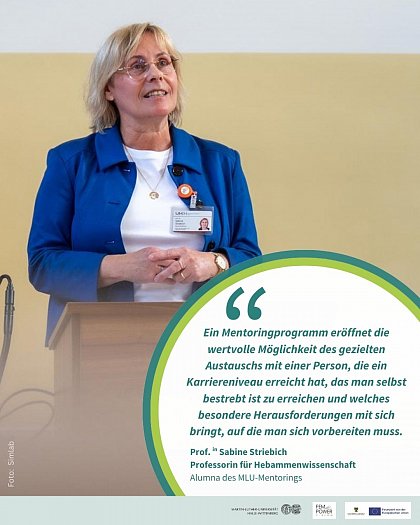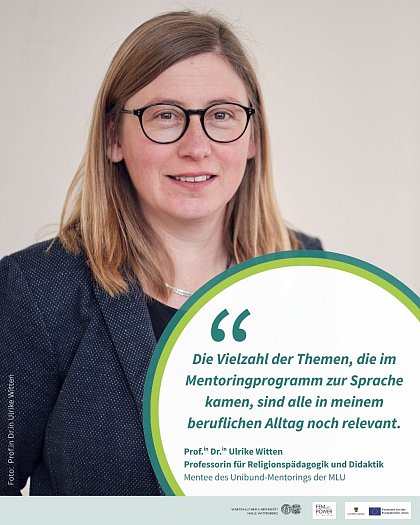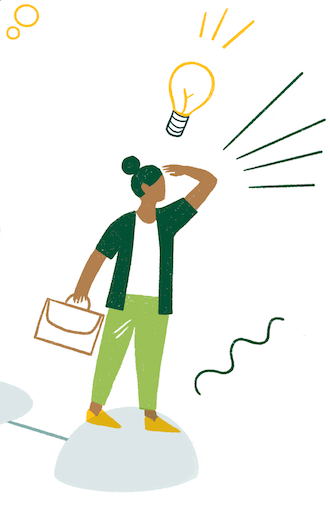Alumni-Talk
M.Sc. Juliane Müller
Alumna of the MLU mentoring program

Congratulations on your project position. How do you feel at this point in your career?
I feel like I'm exactly where I want to be. My goal is to improve work—and digitalization is a huge lever for that. As a VR coach and business psychologist, I help small and medium-sized companies try new approaches and create a positive work culture. I am motivated by the fact that I can directly initiate change with such impulses—that gives me a lot of energy.
Were there any contacts or impulses from the mentoring program that were particularly influential for your academic career?
Absolutely! Especially in conversations with my mentor, I was able to honestly reflect on an important career decision—that gave me clarity and confidence. And during an evening chat with publisher Barbara Budrich, I learned a lot about academic writing and publishing. These ideas still guide me today in my work at the interface between academia and practice
Which skills or perspectives did you particularly strengthen or gain through the exchange with your mentor?
The exchange with my mentor helped me broaden my horizons and gain new perspectives. She showed me that you don't have to do everything (e.g., edit a volume) and that options beyond a university professorship can also be exciting.
What advice would you give to female scientists who are at the beginning of their careers and are considering participating in a mentoring program?
Do it! Even if, like me, you already have informal mentors, a formal mentoring relationship offers a different kind of space: you can simply “take,” ask questions, and learn from the experiences of others. You can only win!
Prof.in Dr.in Sabine Striebich
Alumna of the MLU mentoring program

Congratulations on your professorship. How do you feel at this point in your career?
Taking on this university professorship is a dream come true for me. Midwifery science is a rapidly developing field, and chairs at university medical faculties are few and far between. I am delighted and proud that I met the criteria for the appointment and can now devote myself to the tasks of a founding professorship.
Were there any contacts or influences from mentoring that were particularly formative for your academic career?
Before and during my doctoral studies, I was employed as a research assistant in a third-party funded project at MLU. I participated in a mentoring program once during my doctoral studies and once as a postdoc, and I found both experiences to be very supportive.
The mentor's descriptions of her personal experiences, how she dealt with challenges, and her encouragement helped me develop my own strategies for defining the next steps for me and reflecting on the direction and goals of my career planning. With the help of accompanying interdisciplinary events on topics such as self-presentation, leadership, women in science, and rhetoric, I expanded my skills and was able to connect with women at the same stage in their careers. The support provided by a mentor gave me the opportunity to have prepared discussions on topics that were important to me at the time. The mentor's descriptions of her personal experiences, how she dealt with challenges, and her encouragement helped me to develop my own strategies for defining the next steps for me and reflecting on the direction and goals of my career planning. With the help of accompanying interdisciplinary events on topics such as self-presentation, leadership, women in science, and rhetoric, I expanded my skills and was able to exchange ideas with women at the same career stage—and discover common ground. This was very helpful because I gained an overview of the field and was able to better position myself in relation to my subject and university.
Which skills or perspectives did you particularly strengthen or gain through the exchange with your mentor?
I have developed an awareness that there are particular challenges in an emerging field that must be met and prepared for: developing the degree program and building up the department is dedicated, visionary pioneering work that requires full commitment. There are limited resources and, at the same time, high demands and expectations placed on the chair by the faculty, staff, and students. You need the ability to think and plan in a goal-oriented, prudent, and long-term manner, which requires a high degree of compromise and diplomacy. Research structures and academic recognition must first be developed—this requires commitment on many levels.
What advice would you give to female scientists who are at the beginning of their careers and are considering participating in a mentoring program?
A mentoring program offers the valuable opportunity for targeted exchange with a person who has reached a career level that you yourself are striving to achieve and which brings with it particular challenges that you need to be prepared for. The exchange takes place in a planned, reflective manner, so that you can shape it according to your own needs. In the best case, a stable, confidential, collegial relationship develops that provides strengthening, helpful support over many years. Definitely apply!
Prof.in Dr.in Ulrike Witten
Alumna of the MLU mentoring program

Congratulations on your professorship in religious education at Bielefeld University! How do you feel at this point in your career?
Thank you very much for your congratulations! I feel very comfortable at Bielefeld University. There is a great program for new appointees and lots of support options that make it easy to settle into the new role. But I don't feel any different myself. I can now continue my curiosity and enjoyment of research in a wonderful way—and in a new and exciting context, in exchange with new colleagues.
You participated in the UNIBUND mentoring program. Since participating in the program, which topics have you been more actively aware of in your everyday work?
The multitude of topics that were discussed in the mentoring program are all still relevant in my everyday professional life. Through the mentoring program, with its mentorship and workshops on a wide variety of topics, my knowledge has become more “explicit.” An initial workshop on what to focus on during the postdoctoral phase was very helpful. But the opportunity to discuss questions about academic habits with my mentor in a safe space was also very beneficial. Equally helpful were the helpfulness and open exchange among the mentees on questions about job applications, work-life balance, and much more.
How connected do you feel to the topic of mentoring? Would you take on the role of a mentor yourself?
Yes, the topic is still important to me. Although I am not yet involved in an official mentoring network, I enjoy sharing my knowledge and am approachable. There are many reasons for this: because I myself have benefited from mentoring, I would like to pass this on—also because it wasn't so long ago that I was considered a “young scientist” myself, and I can still empathize with others in this position—and because the questions never stop coming; new ones are always popping up. Being able to turn to others, whether mentors or peers, with questions and requests for advice in confidence is an opportunity that should be seized.





